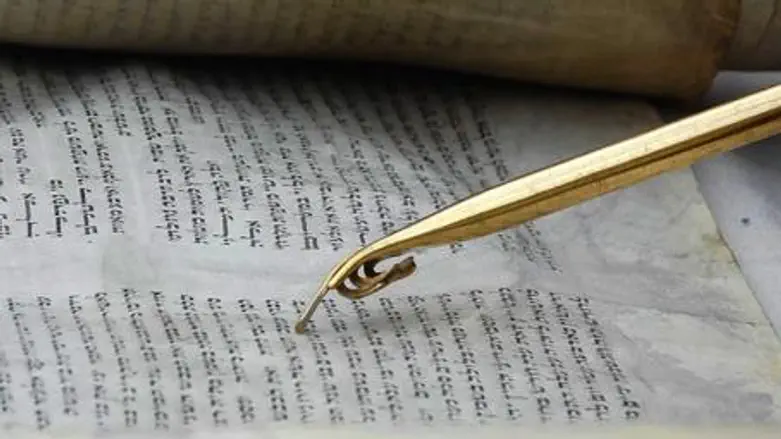
Jewish men and women in Israel will join their brethren around the world to learn all night Tuesday, although in Israel the holiday is observed for only one day. Many will also be eating dairy foods and putting greenery in their homes and synagogues, all in the name of observing the Shavuot holiday.
The practice of learning all night is a custom, rather than a commandment, and is the expression of one's desire to draw closer to G-d. It also is carried out to counter the behavior of the Jews who slept at Mount Sinai instead of waiting for the giving of the Torah. By staying up the entire night and studying, their descendants strive to rectify the slight caused to the honor of the Torah.
For weeks before the holiday, all of the Jewish newspapers, both local and national, carry advertisements for lectures and seminars in synagogues throughout Israel for those who are not in yeshivas Some provide a festive environment to aid people who have difficulty staying awake. The religious high school system has chipped in, with many institutions scheduling final matriculation exams in Gemarra (Talmud) for the next morning in order to encourage study all night. A newer custom is that not only do boys go to their yeshivas for the holiday, but girls studying at religious Zionist high schools, Ulpanas, go to their dorms and study or hear lectures all night as well after a festive meal together.
As always, prayers and learning are being held through the night at the Western Wall (the Kotel). Jerusalem hotels are packed to capacity as tourists who remember past years, and those who have been told of its beauty, wait with anticipation for the event. Right before dawn, one can see tens of thousands making their way to the Wall for early morning prayer service. On the way, hospitality tables and tents are set up to serve refreshments, this in memory of traditional hospitality during the "aliya laregel" (coming to Jerusalem for Passover, Sukkot and Shavuot as prescribed in the Torah) in Temple times. The Kotel is jampacked on Shavuot morning and participants can make kiddush and have light refreshments there or on their way home after services.
Elsewhere in the country, the Breslov and Chabad Chassidic movements will hold all-night Torah study sessions in Tel Aviv, as will the national religious Tzohar organization.
Shavuot is the yahrzeit (memorial day) of the Baal Shem Tov, the founder of Hassidism, and also of the Imre Emet, the famous Rabbi of Gur, who is buried in Jerusalem and whose followers come to the city in droves for the holiday to visit his grave.
IDF Soldiers Help Write a New Torah at Masada
In anticipation of the Shavuot holiday, a battalion of IDF soldiers visited the Judean Desert fortress of Masada last week to watch a scribe write a Torah scroll, but ended up participating in the process. Rabbi Shai Abramovich, ensconsed in a special glass-encased chamber within the ancient synagogue atop the wind-swept archaeological site, guided each soldier as he wrote a letter in the Torah. 
Rabbi Shimon Elharar, the rabbi of Masada and director of the Chabad-Lubavitch center at the Dead Sea, had invited the soldiers to participate in the writing of the Torah after noticing their deep interest. Rabbi Elharar, an emissary of the Lubavitcher Rebbe, Rabbi Menachem M. Schneerson, worked together with Eitan Campbell, director of the Masada National Park, to bring the ancient synagogue back to life from the ruins.
Israel Goes White for Shavuot
Newspapers are also carrying recipes for special dairy-oriented recipes and are bursting with advertisements for special sales of dairy products.
Israeli supermarkets and small groceries are packed with cheeses and other dairy items that are often difficult to find, and the dairies have worked overtime to meet the extra demand.
“I wait all year for this holiday,” enthused Alan Wertheimer, a new immigrant from New York with a culinary background. “Even in the States, we see items we generally cannot find – and here, the selection is simply amazing.”
Why Dairy?
It is customary to eat dairy foods on this holiday for a number of reasons. One is the numerical value of the Hebrew word for milk – chalav – which totals 40, the number of days Moses spent on Mount Sinai when he went up to receive the Torah.
Another reason Jews eat dairy foods on Shavuot has to do with the fact that with the giving of the Torah, Jews became obligated to observe the kosher laws. Since the event took place on the Sabbath, no slaughtering could take place – and thus on that day, the Jews ate dairy.
Among Chassidim, there is another custom, to first eat dairy, and then after a break, to eat a traditional holiday meat meal. This custom commemorates the two-loaf bread offering that was brought in the Holy Temple.